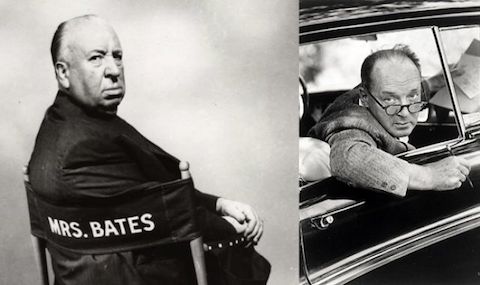
Alfred Hitchcock, writes James A. Davidson in Images, “is usually mentioned in the same breath with Cornell Woolrich, the literary ‘master of suspense,’ ” not least because he adapted a novella of Woolrich’s into Rear Window (1954).” Yet Davidson himself finds in Hitchcock “a much greater affinity with that of the Russian émigré writer Vladimir Nabokov, with whom he is not typically associated since there is no apparent connection” like the one between Nabokov and Stanley Kubrick, who brought Nabokov’s novel Lolita to the screen. Hitchcock and Nabokov never similarly collaborated, but not out of a lack of desire. Close historical contemporaries and mutual admirers, the writer and the director did once exchange letters discussing film ideas they might develop together. You’ll find the full text of both Hitchcock’s query and Nabokov’s interested response at the American Reader.
“The first idea I have been thinking about for some time is based upon a question that I do not think I have seen dealt with in motion pictures or, as far as I know, in literature,” wrote Hitchcock to Nabokov on November 19, 1964. “It is the problem of the woman who is associated, either by marriage or engagement, to a defector.” After filling out a few details, suiting the concept perfectly to what he calls “the customary Hitchcock suspense,” he lays out a second, about a young girl who, “having spent her life in a convent in Switzerland due to the fact that she had no home to go to and only had a widowed father,” suddenly finds herself released back to the hotel run by her father and his entire family. But ah, “the whole of this family are a gang of crooks, using the hotel as a base of operations,” which would lead into the telling of an “extremely colorful story.” Replying nine days later, Nabokov admits that Hitchcock’s first idea, about the defector’s wife, “would present many difficulties for me” due to his unfamiliarity with “American security matters and methods.” The one about the criminal hotel, however, strikes him as “quite acceptable,” and he goes on to make two pitches of his own.
Nabokov’s first idea, something of a reversal of Hitchcock’s first one, involves a defector from the Soviet Union in the United States. His second focuses on a starlet “courted by a budding astronaut.” When this astronaut returns home famous from a major mission, the actress, whose “starrise has come to a stop at a moderate level,” realizes “that he is not the same as he was before his flight.” Unable to put her finger on it, she “becomes concerned, then frightened, then panicky.” Nabokov tantalizingly mentions having “more than one interesting denouement for this plot,” but alas, we’ll never see them cinematized, and certainly not by the likes of Hitchcock. “One can only imagine the kind of involuted, complex, and playful work these two men would have produced,” writes Davidson. “What is left, in the end, is the work they produced, which can be well summarized by a line the fictional John Shade wrote in Pale Fire: ‘Life is a message scribbled in the dark.’ ”
Related Content:
21 Free Hitchcock Movies Online
François Truffaut’s Big Interview with Alfred Hitchcock (Free Audio)
Vladimir Nabokov Marvels Over Different Lolita Book Covers
Vladimir Nabokov (Channelled by Christopher Plummer) Teaches Kafka at Cornell
Colin Marshall hosts and produces Notebook on Cities and Culture and writes essays on cities, Asia, film, literature, and aesthetics. He’s at work on a book about Los Angeles, A Los Angeles Primer. Follow him on Twitter at @colinmarshall or on his brand new Facebook page.


Leave a Reply